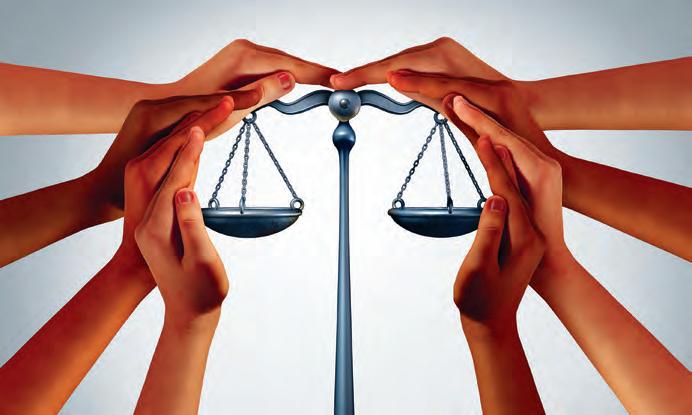
3 minute read
Working to Build Bridges
Working to Build Bridges Among all Americans Are Muslims aware that they are obligated to support calls for justice in this moment and always for everyone — not just for fellow Muslims? BY ROULA ALLOUCH
We have recently been experiencing a long overdue reckoning with an awakening to the Black experience and the history of anti-Black racism in all areas of our society, be they in housing, education, our failing criminal justice system or elsewhere. The murders of Ahmaud Arbery, Breonna Taylor and George Floyd pushed these issues to the forefront, and thousands of protestors, led by the millennial generation, are doing their best to keep them there.
Advertisement
As Americans struggle with these issues, each of us is surrounded with opportunities to talk with others about this reality and how to eliminate it. Muslims in the U.S., who must begin to confront their own racism and discrimination, also have an opportunity to lead by example, showing how we can use our faith’s authority to move forward together, united shoulder to shoulder.
“O humanity! Behold, We have created you all out of a male and a female and have made you into nations and tribes so that you might come to know one another. Verily, the noblest of you in the sight of God is the one who is most deeply conscious of Him. Behold, God is all-knowing, all-aware” (49:13).
This verse is often cited to signal that our Creator intended our vast diversity so that by
living together we would come to know each other. We’re not expected to remove our differences or to know one another despite our unique backgrounds, but to do so as members of various nations and tribes. Notably, this verse reminds us the noblest among us are those who are the most conscious of God. Read as a whole, this verse constantly reminds us that how we interact with and treat our fellow human beings, regardless of gender, ethnic background or national origin, reflects our level of God consciousness.
As Americans, history and current experiences inform us that our society has not yet achieved this goal. In fact, 49:13 states that
IN FACT, 49:13 STATES THAT WE WEREN’T MEANT TO KNOW ONE ANOTHER AS A MELTING POT, BUT AS A DIVERSE POPULATION RICH IN TERMS OF BOTH OUR DIFFERENCES AND THE EQUITABLE OPPORTUNITIES AVAILABLE TO EACH ONE OF US.
we weren’t meant to know one another as a melting pot, but as a diverse population rich in terms of both our differences and the equitable opportunities available to each one of us.
Our diversity is one of the qualities I appreciate most in my beloved community. According to the 2011 Pew Research Center study, the Muslim American community is among the country’s most diverse, for no racial or ethnic group makes up more than 40% of its population. We are Americanborn and immigrant, young and old, reverts and born Muslims — all struggling to understand Islam as our own. Many times I’ve walked into a prayer hall or community gathering and caught my breath at the sheer beauty present in the space.
I firmly believe that our diversity, when coupled with our faith tradition and the prophetic example, enables our community to serve as a shining example of how to eliminate anti-Black racism in our country (and community) and build bridges of true brotherhood and sisterhood. After all, as Prophet Muhammad (salla Allahu ‘alayhi wa sallam) stated in his Farewell Sermon: “An Arab has no superiority over a non-Arab, nor a non-Arab has any superiority over an Arab; also a White has no superiority over a Black, nor a Black has any superiority over a White except by piety and good action.”
Muslim Americans often struggle with how our country’s systemic and institutionalized racism impacts us as a faith community, particularly when we recognize that racism and discrimination are un-Islamic. Even worse, many non-Black Muslims express shock at the very fact that racism exists even among themselves. As a collective, we should be mindful of the hurt and harm that this willful ignorance and disregard for the experiences of our brothers and sisters causes them.
At times when I’ve personally confronted or even just delicately addressed intra- and inter-Muslim racism, I’ve encountered defensive reactions that such things are impossible because Islam doesn’t allow them. If only we each applied our beloved Prophet’s example so perfectly that this was true!
In reality, nothing will change until we name, call out and stop accepting these realities. Using derogatory language, operating liquor stores in majority-Black neighborhoods and accepting media portrayals that misrepresent and stereotype the Black community (even while generally recognizing the media’s predominant anti-Muslim bias) are just a few of the challenges we face.










